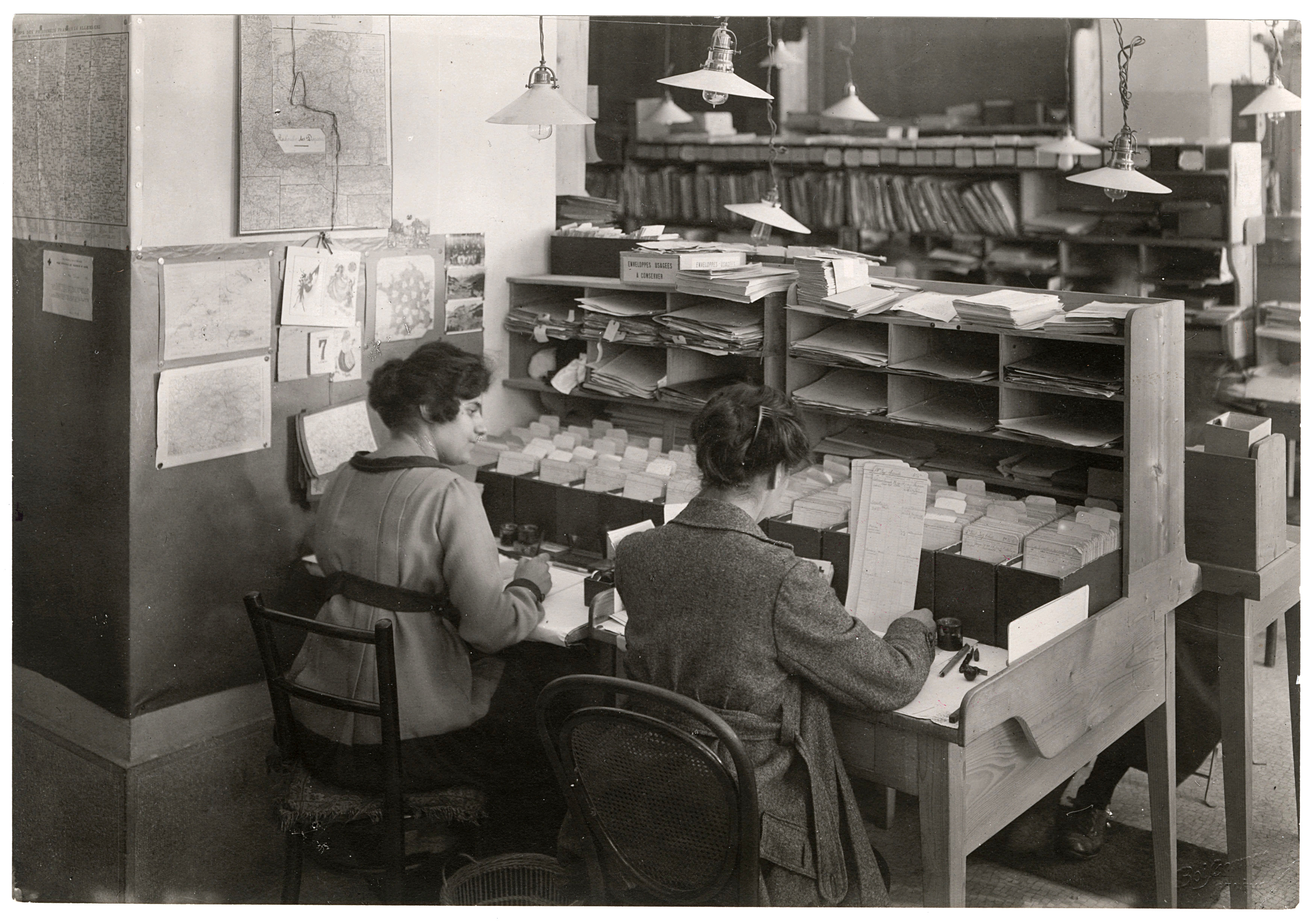How the ICRC stood by First World War prisoners

Geneva, September 1914. Handed a list of names of captured soldiers, a typist at the International Prisoners-of-War Agency (IPWA) fixes an index card in place and begins to type. By the end of the Great War, that card will be one of seven million.
Within weeks of the outbreak of the First World War, the IPWA, housed in the Rath Museum, was set up by the International Committee of the Red Cross (ICRC). The agency was a hive of activity, and by the end of that year, some 1,200 people – mostly women – were working there.
Over the next four years, seven million index cards, tracing the destinies of two and a half million prisoners of war, were created by the staff and volunteers, as part of a vast filing and cross-referencing system developed to deal with the deluge of information requests.
In addition to helping restore contact between people separated by war, the ICRC rapidly expanded its activities, organising prison camp inspections and prisoner exchanges, as well as advocating publicly for the protection of the victims of war.
A few good men
At the start of that decade the ICRC was indistinguishable from many of the 280 small-scale philanthropic organisations operating in Geneva, involved in good deeds and humanitarian assistance. The committee consisted of a group of ten well-meaning and well-connected men, drawn from bourgeois families in Geneva, meeting in their spare time.
“Its activities were uniquely office activities. It wrote letters, received correspondence and reflected theoretically on the law of war and victims of war,” ICRC historian Daniel Palmieri told swissinfo.ch.
But in the 50 years following its inception in 1863 it had won the confidence of governments and played a part in the creation of over 50 Red Cross and Red Crescent Societies throughout the world.
Galvanised into action by the Great War happening on its doorstep, the ICRC was transformed into a truly international and influential organisation. In February 1918 it launched an appeal against the use of poisonous gases in warfare. A ban followed in 1925 under the Geneva Protocol.
In the early days of the conflict, the main concern was the welfare of prisoners of war.
Initially the fighting was centred on Germany, France and Belgium, and within a short space of time the warring nations had captured prisoners of war by tens and hundreds of thousands.
During the First World War, the International Prisoner-of-War Agency collected, analysed and classified information it received from the detaining powers and national agencies about prisoners of war and civilian internees.
It compared this information with requests submitted to it by relatives or friends, in order to restore contact between them. The agency’s archives also contain diplomatic correspondence between the ICRC and the warring countries on protection for detainees and reports on visits by ICRC delegates to prisoner-of-war camps.
The agency’s collections consist of some 500,000 pages of lists and six million index cards.
The ICRC’s archivists have been working on a project to restore and scan the lists and index cards. Once this project has been completed, anyone will be able to search the archives directly on the internet as of August 2014 through an online application.
Information overload
The scale of the war was exceptional, not known since the Napoleonic era. The ICRC committee members set to work, requesting lists of prisoners from the countries involved.
At first volunteers, who were friends and relatives of ICRC members, ran the International Prisoners-of-War Agency. But they were soon snowed under by the 16,500 letters they were receiving daily and began to recruit help more widely.
“What is interesting is that the committee succeeded in recruiting people who had a perfect sense of organisation. Some became heads of department, notably a woman called Renée-Marguerite Cramer, a librarian, who had the idea of using index cards linked to catalogues for the compilation of information,” Palmieri said.
In 1918 Cramer became the first female member of the ICRC committee. By that point women’s place in the organisation at all levels had been established.
Voices from the past
swissinfo.ch visited the ICRC World War I archive in Geneva, to view some of the correspondence, POW lists, and the boxes of index cards – one per query, one per captured soldier – which still give poignant testimony of individual destinies 100 years later. These archives are being digitised and will be available for consultation to the public from August 2014 through an online application (see infobox).
Listen to Daniel Palmieri giving the background to some lists of German prisoners of war here:

More
Daniel Palmieri and Clare O’Dea at the ICRC archives
A section of the agency was dedicated to civilians caught up in the conflict, – those held hostage, deported or interned – the first time the ICRC extended its activities to include civilians.
Many civilians living in the ‘wrong’ country or an occupied zone found themselves interned and the IPWA was called upon to help restore contact between the internees and their loved ones.
In the archives, we came across one letter, addressed to the president of the ICRC by a woman in Paris, concerning a French math professor at the University of Lille interned by the Germans in occupied territory.
“He has suffered the atrocious reprisals of three war camps, including his latest residence Heidelberg where he has been interned since the beginning of the month … where he is dying of hunger, exhaustion and exposure,” she wrote.
The ICRC managed to organise prisoner exchanges for some 10,000 soldiers. Switzerland was involved in the transfer of seriously ill and injured prisoners, such as blinded soldiers and amputees, between Lyon and Konstanz.
From 1915 there were also men who were injured, not seriously enough injured to be evacuated, but still who posed problems in the camps, as they required medical assistance.
It was agreed that a number of these prisoners could be interned in a neutral country so that they could recover but still not be directly redrafted by the enemy.
Between January 1916 and November 1918, some 68,000 soldiers of all nationalities were interned in Switzerland, mainly in mountain resorts, replacing the tourists driven away by the war. In some cases families were able to come and visit the internees.
Reprisal camps
Reprisal camps were the unfortunate outcome of rumours and revenge. If one country heard that its imprisoned soldiers were being treated badly, it retaliated by inflicting bad conditions in some of its own camps.
One of the reprisal measures used by all the warring countries was to make prisoners work near the front, for example digging trenches, which was forbidden under the terms of the Conventions of the Hague and Geneva.
A 1917 letter, signed by Horace Rumbold, British ambassador to Bern, illustrates this problem: “They inform me that the statement in the Wolff [German press agency] telegram, which appeared in the papers on that date, to the effect that England had followed the example of France in employing German prisoners in the firing line is absolutely untrue. … Employment may be on railways or roads but not within the range of the enemy’s artillery.”
“Denials were standard but at certain times and in certain places, violation of the law was frequent and absolute,” Palmieri said.
In this climate, the ICRC had begun sending out representatives to inspect conditions at prisoner of war camps. More than 500 camps were visited in 54 missions and the delegates’ reports were published and sold, to counteract propaganda and show impartiality.
This pioneering work became one of the core activities of the ICRC, part of the humanitarian structures it would from then on automatically put in place to assist the victims of conflict all over the world.

In compliance with the JTI standards
More: SWI swissinfo.ch certified by the Journalism Trust Initiative

You can find an overview of ongoing debates with our journalists here. Please join us!
If you want to start a conversation about a topic raised in this article or want to report factual errors, email us at english@swissinfo.ch.